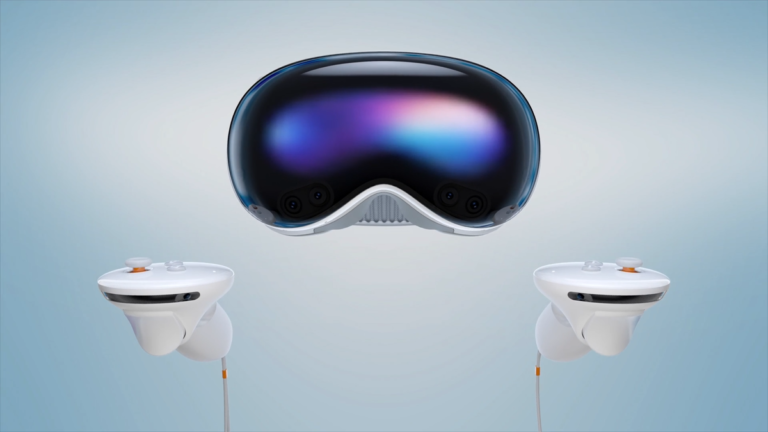The Surreal Touch Kickstarter campaign has been successfully funded.
The Surreal Touch controllers were first announced back in July. A Kickstarter campaign was launched last week with a $50,000 goal, and to date has raised nearly $90,000 from 330 backers.
What is Surreal Touch and who makes it?
The Apple Vision Pro’s gaze-and-pinch interaction system can feel almost telekinetic at times, making watching media and simple interactions a breeze, but the lack of trackable controllers means it’s not suited to many of the types of games and experiences you can play with other headsets.
Surreal Touch is a self-tracking controller designed to solve this problem. It uses two fisheye tracking cameras and an onboard chipset to determine your position in space. It’s similar to Meta’s Touch Pro controller, but with one less camera, and features the same design and control elements as the Touch controller, including two action buttons, a thumbstick, and an index and grip trigger.
The startup claims sub-10mm positioning accuracy, which it describes as “unparalleled tracking,” a strange claim considering Meta and Valve have targeted sub-1mm for their VR controllers.
Surreal Touch is designed to be used standalone on an Apple Vision Pro using the startup’s soon-to-be-released SDK, or in PC VR via the startup’s visionOS app, Surreal Link, a fork of the open-source ALVR that adds interfaces for pairing controllers, among other things. Yang said the native visionOS SDK has already been tested by Open Brush contributors who are working on a porting effort.
Surreal Interactive was founded by Zhenfei Yang, who has eight years of experience in SLAM computer vision technology and previously led DJI’s entire robotics computer vision group, he told UploadVR. Yang said Surreal’s team also includes former Alphabet engineers who worked on Google Glass, Google Maps, and Waymo’s self-driving car projects.
Alongside the campaign launch, Surreal Interactive also unveiled new PC VR streaming gameplay footage. Most notably, the startup had previously only released Beat Saber on normal difficulty, but now shows the founders using Surreal Touch to beat Rum n’ Bass on expert difficulty.
PC VR footage of “Real VR Fishing,” “Superhot VR,” and “Gorilla Tag” was also released.
Surreal Touch connects to a PC via the startup’s Surreal Link software, which is a spinoff of the open-source tool ALVR. To demonstrate that the software is ready for buyers, Surreal has also released a video showing the entire process of pairing and setting up the controllers for Surreal Link, which takes just over 90 seconds in total and ends with you landing in SteamVR Home.
For those who don’t have a gaming PC or for traveling, Surreal says it’s still working on a native SDK that will allow developers to add support for Surreal Touch to their visionOS apps.
The startup says its “goal” is to have 12 visionOS games that support Surreal Touch by the time the controllers ship to backers. The company claims to be partnering with “multiple studios” developing VR games for “sword fighting, table tennis, fishing, golf, and boxing,” and specifically acknowledges that it has provided hardware to the developers of Contractors and Grimlord.
As a teaser of the SDK in action, Surreal has released footage of Open Saber, an open-source Beat Saber clone with added Surreal Touch support, running standalone on an Apple Vision Pro.
Surreal is offering backers “early bird” prices ranging from $250 to $318 depending on how early they back the game, with the company planning to make the regular retail price around $370 after the campaign ends on October 10th.
The startup claims that the first 300 units of each of the two color options will ship in December, with all backer orders being shipped by the end of January.
Surreal claims to work with “trusted manufacturers” and will let backers know of any production delays or issues. Prototyping a hardware product is relatively easy compared to mass-producing it cheaply, on time, and at scale. Numerous VR startups over the past decade have failed to make this leap despite impressive demos and confident claims. But if Surreal can pull this off, visionOS could become a viable gaming platform for genres where hand tracking simply isn’t practical.


